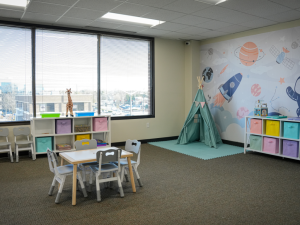Autism spectrum disorder (ASD) is a complex developmental condition that affects social interaction, communication, behavior, and learning. It’s estimated that 1 in 36 children in the U.S. are diagnosed with autism, with a wide range of abilities and challenges across the spectrum. Early intervention is key in helping children with ASD develop essential skills and reach their fullest potential. One of the most effective interventions for young children with autism is Applied Behavior Analysis (ABA).
What is ABA Therapy?
Applied Behavior Analysis (ABA) is a scientific approach to understanding behavior and learning. ABA therapy focuses on using positive reinforcement to teach new skills and reduce challenging behaviors by breaking tasks into smaller, manageable steps. The therapy is individualized to meet the unique needs of each child, making it one of the most versatile and widely used methods for treating autism. Whether the goal is to improve communication, reduce problematic behaviors, or teach independent living skills, ABA has been proven to be an effective, evidence-based intervention.
Why Early Intervention in Autism Matters
The early years of a child’s life are crucial for brain development. During this time, the brain is particularly malleable, making it an ideal period for intervention. Research shows that when children with autism receive early, intensive therapy, they tend to show significant improvements in communication, social skills, and behavior. Early intervention programs, especially those that include ABA, help maximize this developmental window, leading to better long-term outcomes. Here are several key benefits of early intervention in autism, particularly when using ABA techniques:
1. Maximizing Brain Plasticity
The first few years of life are critical for brain development. During this period, the brain is highly adaptable, allowing children to learn new skills more quickly and efficiently. By starting ABA therapy early, children with autism can benefit from this period of heightened neuroplasticity, which increases their ability to form new neural connections and acquire essential skills, such as communication, social interaction, and self-regulation.
2. Improving Communication and Social Skills
One of the core challenges for children with autism is difficulty with communication and social interaction. ABA therapy can help teach children functional communication, whether through spoken language, sign language, or alternative communication devices. By using a structured approach, ABA focuses on teaching children how to express their needs, engage with others, and understand social cues, ultimately improving their ability to connect with their peers and adults.
3. Reducing Problematic Behaviors
Many children with autism display challenging behaviors, such as tantrums, aggression, or self-injury. These behaviors can hinder their ability to learn and interact with others. ABA therapy works to identify the causes of problematic behaviors and replace them with more appropriate alternatives. Positive reinforcement, along with teaching coping mechanisms and self-regulation techniques, helps reduce disruptive behaviors and promote more adaptive behaviors.
4. Promoting Independent Living Skills
In addition to improving communication and behavior, ABA therapy also focuses on teaching practical life skills. These can include daily tasks such as dressing, toileting, eating, and personal hygiene. By breaking down complex tasks into smaller, more manageable steps, ABA empowers children to gain independence in these areas, enhancing their quality of life and fostering a sense of accomplishment.
5. Supporting Long-Term Success
Early intervention doesn’t just improve short-term outcomes; it sets children up for future success in school and in life. Children who begin ABA therapy early are often better equipped to succeed in mainstream classrooms, build relationships, and eventually lead more independent lives. The earlier a child starts therapy, the better their chances of minimizing developmental delays and achieving long-term success.
6. Empowering Families
When a child is diagnosed with autism, it can be an overwhelming experience for families. ABA therapy often includes parent training to ensure caregivers are equipped with strategies to reinforce the child’s skills and manage behaviors at home. This collaboration between therapists and parents fosters a supportive environment that extends beyond therapy sessions, leading to more consistent progress and a better quality of life for both the child and their family.
The Research Behind ABA Therapy
Numerous studies and organizations, including the U.S. Surgeon General and the American Academy of Pediatrics, recognize ABA as the gold standard treatment for autism. Research consistently supports its effectiveness in improving communication, socialization, behavior, and academic performance. Early, intensive ABA therapy has been shown to lead to long-lasting improvements for children with autism, making it one of the most reliable options for early intervention.
Take Action for Your Child’s Future With IABS
Autism is a lifelong condition, but with early intervention in Autism, children with ASD can achieve meaningful progress. ABA offers a structured, data-driven approach to helping children develop essential skills and reduce problem behaviors. The earlier these interventions begin, the greater the chances for success. By addressing the unique needs of children with autism early in their development, ABA can have a transformative impact, enabling them to lead more independent, fulfilling lives. Families, educators, and healthcare professionals should work together to ensure that children with autism receive the support they need as early as possible for the best long-term outcomes.
If you’re looking for ABA therapy near me, or need at-home ABA therapy in Herndon, VA, Silver Spring, MD, or surrounding areas, Integrated Autism Behavior Services (IABS) is here to support you. Our team of experienced and compassionate ABA therapists is dedicated to providing personalized care in the comfort of your home. We understand that each child is unique, which is why we customize our approach to meet your family’s specific needs. We believe that early intervention can make a world of difference, and our goal is to help your child reach their full potential. Don’t wait—take the first step toward your child’s growth and success. Call us today or visit our website to learn more and sign up for at-home ABA therapy. Together, we can help your child thrive.





